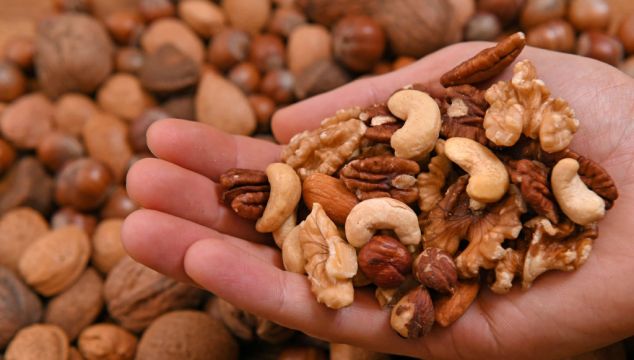Eating a handful of nuts every day is associated with a 17 per cent lower risk of depression, scientists have said.
Data gathered from the UK Biobank, an online database of medical and lifestyle records of around 500,000 Britons, suggests middle-aged and older adults who consumed a daily 30g serving of nuts – including walnuts, almonds, Brazil nuts, cashews, hazelnuts, and pistachios – were less likely to report taking antidepressants or getting diagnosed with depression.
While the findings, published in the journal Clinical Nutrition, do not explain why this happens, the researchers speculate that anti-inflammatory and antioxidant properties of nuts may have a protective effect.
The team said nuts contain essential nutrients – in the form of bioactive substances such as phenols or phytosterols, essential micronutrients, fibre, high-quality protein, monounsaturated and polyunsaturated fatty acids, and vitamins – that could play a beneficial role in mental health.
Bruno Bizzozero-Peroni, a researcher at the Health and Social Research Centre at the University of Castilla-La Mancha in Spain, said: “Our findings highlight yet another benefit of consuming nuts, with a 17 per cent decrease in depression associated with nut consumption.
“This provides an even stronger rationale for people to become enthusiastic about consuming nuts.”
For the study, published in the journal Clinical Nutrition, the researchers looked at data from more than 13,000 people aged 37-73, between 2007 and 2020.
These people did not report having depression at the start of the study.
Questionnaires were used to assess nut consumption and over the course of the study, self-reported doctor’s diagnosis of depression or antidepressant use were recorded.
After a follow-up of more than five years, more than 1,100 (8.3 per cent) cases of depression were recorded.
Results also revealed those who had a low to moderate nut consumption – defined as one serving of 30g per day – had a 17 per cent lower risk of depression, compared to those who did not eat nuts.
The researchers said this finding was regardless of other factors that might influence mental health such as lifestyle, medical conditions, and body mass index.
The team wrote: “Our results highlight the potential role of nut consumption as a healthy dietary behaviour to prevent depression in those free of other known risk factors for depression, such as obesity, unhealthy lifestyle behaviours (smoking, frequent alcohol consumption, low intake of fruits and vegetables, insufficiently active, and inadequate sleep duration), loneliness, and medical conditions such as cardiovascular, metabolic, or mental comorbidities.”
Commenting on the study, Dr Jenna Macciochi, senior lecturer in immunology at the University of Sussex, who was not involved in the research, said: “This study builds on the growing literature in nutritional psychology showing diet to be a factor in mood disorders.
“Specifically, they found a positive association between nut intake and a lower risk of depression compared to no nut intake.
“This study shows association and does not prove a mechanistic effect, but the authors do suggest multiple feasible mechanisms through which nut consumption may be working.
“I think there is still a lot we need to learn regarding the potential mechanisms at play and a deeper understanding of this in the future will be useful when making dietary recommendations.
“In the meantime, the best evidence for supporting good mental health through diet is probably from consuming a Mediterranean-style anti-inflammatory diet pattern of which nuts are considered to be a component of.”







